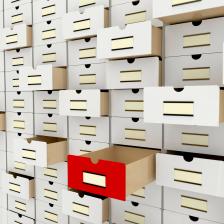The World of Big Data (Part 1)
You may have heard the term “Big Data” before, but did you ever wonder what it means exactly, or more importantly, how it affects your life? That’s the question Tech Talker answers in Part 1 of his series on Big Data.
You may have heard the term “Big Data” before, but did you ever wonder what it means exactly, or more importantly, how it affects your life? Today we’ll discuss just that.
Sponsor: Get started with a free 30-day trial of eVoice®.
What Is Big Data?

Many of you are probably familiar with gigabytes because this is what most of our electronics are measured in. Well, a terabyte is a thousand gigabytes. There are devices such as hard drives that can be measured in terabytes. The next order of magnitude is petabytes, which is 1 million gigabytes, and then followed by the next order of magnitude which is exabytes – that’s 1 billion gigabytes.
Let’s put this into perspective. One petabyte of high definition 1080p video would last for 34 years, non-stop, always playing. Two petabytes of data comprises information from all of the United States’ academic research libraries.
If we take the next jump in magnitude into the exabyte range, things get even more crazy! It’s pretty difficult to put any real perspective to 1 exabyte, but one statistic I came across noted that 1 exabyte would be the record of every word ever spoken by every human being that ever existed. To me, that is insane. To top it off, the SKA telescope initiative is predicted to produce that much data each day within the next few years.
You’ll have to excuse me, I’m an engineer and I get carried away with math and large numbers.
Where Does Big Data Come From?
Your next question might be, where the heck is all of this data coming from? Well there are some research fields that generate vast amounts of data, such as radio telescopes, genomic studies, and advanced physics experiments such as atom smashing in a particle accelerator. This type of scientific research create vast amounts of data, which is then analyzed using a huge network of computers. While this form of Big Data may indirectly impact our lives through new discovery, there is another form of Big Data that gathers its information from elsewhere.
That other form of Big Data is created by us! You’re probably thinking “Come on, Tech Talker, I can’t possibly be creating that much data!” Well you’re probably right. You as an individual are not creating such vast sums of data. However, your online habits are being tracked, cataloged, and analyzed every day.
Think of everything you buy online, your credit score, your search history, your route to work, the groceries you buy, and even your doctor visits. These are just a few of the ways you’re probably contributing to Big Data without ever knowing it! Everything I mentioned is stored away in some database waiting to be analyzed. The power of this data does not lie in any single person, but in the trends that can be teased out of very large datasets.
If you want to play around with some of these huge datasets, Google has a pretty awesome feature called Google Trends, where you can put in search terms and it will show you graphs of where and when those searches took place. You can see interesting habits that occur every year, and even strange searches that pop up in certain places in the world. Check it out at Google trends As an example, I recommend looking up “Shopping” and “War” to see some surprising trends.
Now that we know where Big Data comes from, the next question is: Where is it stored?
Where Is Big Data Stored?

Another interesting example of this type of Big Data is UPS. As you can imagine, UPS generates a ton of data, what with the transit information of all its packages and the routes the drivers take. UPS handles over 16 million packages a day, and over 40 million package tracking requests.
UPS also has 0ver 40,ooo vehicles that it tracks constantly. Through all of this data collection, they are able to find trends and ways of optimizing truck delivery routes to increase efficiency. That’s how UPS was able to shave 85 million miles per day off its delivery routes, saving over 8.4 million gallons of fuel. Keep in mind, people – this is daily!
How Does Big Data Affect You?
I know what you’re going to say next: “Well, this is all great for big companies. They can save money and make money by leveraging Big Data. Fantastic! But how does that affect me?
I’m glad you asked! Big Data is being used to make scientific discoveries that can change all our lives (or our perceptions of our place in the world). Most notably, the discovery of the Higgs Boson this past year – which led to the recent Nobel Prize award for physicists François Englert and Peter W. Higgs. Big Data is also helping us to predict the weather and outbreaks of diseases, as well as helping to cure diseases such as cancer and AIDS.
All of these applications require vast amounts of data and vast amounts of processing power, so much so that the amount of computing power we have today far outstrips anything thought possible even a decade ago.
For instance, the Human Genome Project, which decoded every piece of DNA in the human body, was a huge scientific undertaking. It took 10 years to finally finish in 2003. If we had started the project now, just 10 years later, we could process the same chunk of data in just under a week!

- Big Data is the term used to describe the vast amounts of data collected and analyzed for commercial, scientific, and governmental purposes.
- Companies use Big Data to tailor their products to consumers, as well as cutting down on their overhead costs.
- Scientific advances have been made using Big Data, by crunching trillions of calculations for use in a wide range of fields.
Well that’s all for today!
Have a question about anything in this episode? Or a suggestion for a future podcast? Send me an email at techtalker@quickanddirtytips.comcreate new email or post it on the Tech Talker Facebook wall.
Until next time, I’m the Tech Talker, keeping technology simple!
Data storage and other images courtesy of Shutterstock.







